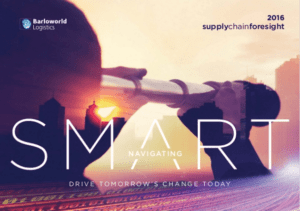 Kate Stubbs, executive of marketing and communication at Barloworld Logistics, presented the findings of the company’s recently concluded supplychainforesight survey for 2016 in Johannesburg last week. Addressing attendees on the findings she said:
Kate Stubbs, executive of marketing and communication at Barloworld Logistics, presented the findings of the company’s recently concluded supplychainforesight survey for 2016 in Johannesburg last week. Addressing attendees on the findings she said:
“Navigating smart is about reflecting and asking South African business leaders: What have we done well over the last few years and how have we adapted to change? And then saying: What lessons have we learnt? And how are we going to go forward? We know we’re living in uncertainty, so what are the strategies, what are the tactics that we’re going to apply to navigate and lead us into an uncertain future?
Part of the supplychainforesight survey involved asking businesses to classify themselves as either squirrels, foxes, ostriches or rabbits. A fox is seen to be dynamic, determined, creative and entrepreneurial. A squirrel is seen to be positive, progressive, thinking and responsive; although it has an element of conservativeness, and is sort of squirrelling away for a rainy day, monitoring the environment.
The rabbit is frozen in the headlights, unsure of what to do, overwhelmed by all the circumstances going on and unable to move. And then there’s the proverbial ostrich with its head in the sand, trying to either ignore what’s going on or not wanting to lead.
It was interesting to note, especially since the survey was done in January/February this year – quite a tough time in the lives of South Africans, especially after coming off the back of a rough December – that 47% of respondents saw themselves as squirrels and 42% as foxes. So 89% of people were positive and optimistic about their future and their businesses.
“If we have a whole lot of squirrels and foxes, we’re well positioned in South Africa to navigate off some of the icepacks we currently find ourselves stuck on.”
We see Supplychainforesight as a tool for you to take back into your businesses or to ask yourself to look and get ideas for what you can do better, how you fared compared to other players in the industry.
As always we had a fabulous response – over 50% of senior leaders, and a whole range of people from across business, from an operational perspective but also from various functions of the business. I think this is truly representative of where supply chain sits today, in terms of how its operational function is understood and used across the business. And the same goes for the industry sectors we had responses from.
Service-based industries
There’s an interesting shift we’ve had over the years – the last two specifically, we’ve been getting new industry sectors emerging and there certainly seems to be a rise of service-based industries.
It is interesting to note that in a study from IBM, they reckon that only 40% of projects last year actually achieved their goals. At a general level, we asked respondents: How has your business fared in terms of performance? 40% of respondents strongly agreed that their business had fared extremely well in terms of the achievement of their strategic objectives, as well as achievement of market share.
But then there’s a slight gap, and the slight gap starts getting wider as we get into a little bit more detail, in terms of how those goals related in terms of profitability and revenue growth. Only a slight gap there, so 37% and 34% respectively felt that they’d achieved their goals.
“66% of respondents felt that their businesses had changed significantly over the past few years; however, only 51% found those changes to be highly effective.”
We all know hindsight’s great, but if you think of the amount of effort that goes into change – it has to raise a question of our ability to manage change, and to identify and to make sure we change for the right reasons. Change for the sake of change is not worthwhile. It’s spoken a lot to a lot of our insights from the last year about leadership. From a leadership perspective, there’s a stronger need to communicate and affect change better. We’re moving to times where leaders need to make courageous decisions.
This was quite an interesting perspective in terms of an industry breakdown. We asked respondents to tell us if they felt threatened by new entries to market; so we know in a contracting economy with globalisation, the playing field is levelled out and there seems to be a much more competitive space. But fascinating, and I don’t know how much detail you can see there, but focus rather on the blue, the green and the red blocks. The blue mean ‘no’, that they didn’t feel any competitive threat, to the red being ‘yes’, we definitely felt competitive threat or new threats, new entrants to our market.
So ITT, retail, FMCG, professional services and healthcare are certainly feeling impacted. Every day a new clothing retailer comes in, while a lot of the local brands are entering with different channels to market. We now have an omni channel and people have different access and different ways of buying. Check how technology is impacting that and changing.
Reality check
A good 90% of respondents feel that over the last few years they have improved significantly. “I have to ask for a reality check there because the last few years have been exceptionally tough and the market has contracted. Are we a bit delusional sometimes? Respondents testify to being extremely positive, but there are lots of gaps in this. So, how real? In what terms? Have we really achieved growth in competitiveness?
Rising operating costs still remains a major challenge and focus area, but it’s often a reactive response to certain environments. At what cost do you manage the cost competitively – in terms of the long-term effectiveness of your business.
“We’ve seen a rise in discussions about cost management versus value management and the need for companies to start understanding which costs create value for the business, and which costs are eroding values in their business.”
Often we feel very proud of ourselves that we’re managing our costs effectively, but do we have the data and do we understand whether we are making the right decisions and investments in terms of costings? Often in supply chain management – depending on the industry – we decide on costly solutions, which adds greater service and therefore, greater value.
Customer engagement and technology have been focus areas and remain a major focus, with traditional landscapes changing. This is a high-touch, high-tech challenge, which almost counter one another. On the one side you try and build customer understanding and get closer to them, and then we want to improve on technology.
Companies able to use technology to get closer, to better understand, to predict customer changes and shifts and provide the right solutions, will do exceptionally well.
Different platforms and types of solutions are out there, which are radically changing the way we do business and are fundamentally changing the way we apply strategies. Those are the shifts we’re grappling with, and they require different thinking and different skill sets.
Skills
It was really sad to see that the least effective strategy for change that companies dealt with were skills. Every single year since 2003, skills have been an issue. There’s a global crisis of skills, but it’s a major issue for us in South Africa.
A Stats SA report published a few months ago stated that the youth of today have fewer skills than their parents did 20 years ago. What does that mean for us? It’s not surprising we see some unrest and frustration in the youth of South Africa. But equally worrying is what it means to the competitiveness of our country going forward. You can have the best strategies and the best infrastructure, but a lack of skills, a lack of competency, combined with new technology and the changes we’re seeing, one wonders what types of skills do we require? Are we nurturing? Are we growing those skills in our schools and in our universities? There’s huge pressure on organisations to grow those skills and develop the best of them.
Different strategies were applied by different people to different industries, but all of them felt they could have done better. 41% of people thought manufacturing was no longer applicable to them. And this led us to asking quite a few questions. Does it talk about the quality of manufacturing in our country? Is it just representing that most people responding don’t manufacture at all? Or does it mean that they outsource their manufacturing to wherever in the world, and they no longer see it as a core part of their business?
“The results talk to the type of labour we have in the country, the skill-level and unemployment rate. You look at manufacturing, at the opportunities in robotics and technology and how that would affect employment opportunities.”
South Africa as a country is spending less on R&D, which talks to our cost management. The reactive response is to cut marketing, cut some of the IT stuff, cut R&D, cut training, cut all the crucial elements that need to create the bedrock of sustainability going forward.
We need to think more carefully where we invest our money. What we unpacked last year was less about just having a secret team developing stuff, and more about creating a mind-set, a culture within your company. Of leveraging the knowledge of all staff and having a mind-set of creation and of trying to fail. How do you create an environment where it’s ok to fail? Too often we are weighed down by our fears.
It’s been fabulous to see the rise of the supply chain industry in South Africa, the rise of its importance, and in understanding the value that it can create in businesses.
Companies have tried to adopt or input programmes and training and technology that haven’t been that effective yet, so there’s a lot of room for improvement in that space.
Outsourcing is an interesting concept. It relates to a control issue for South Africans, because we are known to like to control things as a nation, it’s part of our makeup. Yet, while we understand the value of outsourcing and appreciate that it can have a high impact on business, we don’t do it. And globally it’s a common strategy to outsource, notably in manufacturing and IT, and many other industries.
Is it a control issue? Is it a lack of understanding, because we see that people are willing to partner and collaborate, but they don’t want to outsource. Outsourcing is exactly that, it’s a strategic partnership, it’s not letting go of control; it’s finding someone who has specialised skills to help you focus on the critical part of your business. With so much disruption happening, companies want to keep things close.
The top four elements are all issues out of our control: global politics, globalisation, the economic situation and the weak Rand. This is where we don’t want to become rabbits, and get blinded by what is going on. We still have to try and forge a way forward; we’re not the only country facing these issues. We still need to remain competitive. If you consider the issues that are keeping us awake at night – skills are right up there. Bizarrely, that is still a major challenge for us. We want to grow our businesses, we want to change, we want to remain competitive, but we are all worried about finding the right people to help us do that.
Most industries are going through different regulatory challenges and obviously, owners are frustrated and worried about their businesses. So, the question is, how can we respond? What do we do about these things? What are the things we’re going to focus on?
The good news is we are rabbits and squirrels. 69% of people still said they were excited about the future. We can see opportunity. There’s a level of concern rising; 24% are feeling concerned. But in general, business is still positive that they can find a way forward.
We’re looking to diversify. We’re looking to new customer groups and new markets; it is about losing some of those products and services that are no longer relevant. It’s about getting off the sinking ships and using technology, and looking to forge new customer groups. However, a lot of people have not being quite prepared for the future, they’re not quite sure they have the right setup, the right structures, the right skills in order to achieve their future objectives.
One of the biggest strategies listed for growth and for future sustainability is expansion into new markets. We didn’t see a radical shift in this; South African companies’ major focus area is still Southern Africa.
There is a good balance now between East and West Africa, in terms of growth areas. And interestingly, a rise in Europe, where we’ve seen South African companies take investments they would have put into Africa, back into European countries, to make an investment in a more sustainable currency.
We are cautious how we do these investments. We go through strategic distribution partnerships, rather than looking at longer-term investments. The key focus areas to be included in the future strategy are about creating new customers and looking for new target markets.
We’ve seen from our marketing side, that there’s better acknowledgement of the value of a brand, and an appreciation that companies need to protect, grow and own these. This talks about the strategies and tactics in terms of branding businesses more sustainably.
We are in a contractive market, and operating in really tough times, and so companies are looking at cost. They’re looking at it more smartly and making sure that every Rand they invest is done so wisely. It’s not just about value; it’s more about value creation.
“It’s definitely about customers, but it’s not only about building stronger relationships, it’s about anticipating and understanding them, providing solutions that are right and relevant for them. It is about creativity, it is about looking for different types of opportunities.”
There are enough studies to say that the traditional business model doesn’t necessarily work, that different thinking is required – creative thinking, and different ways of working – look for partners, look for specialists to help you there.
It is a tough environment with opportunities to stand up and lead, to make those decisions. Those of us who do will survive; those who don’t, those who get blinded like the poor rabbit in the headlights, are going to see the reverse.
Logistics is often that unseen thing that’s got to go on, that happens seamlessly behind you. As much as we are able to deal with such life-threatening situations, the opportunity now is for us to make critical decisions in order to navigate smart into the future as leaders in South Africa.
We’re well-positioned to do so; we’re a really positive nation, we are still a nation of squirrels and foxes, but we’ve got to work together in order to forge a different way forward.
Margins will continue to be squeezed. There will be little honour or recognition given and we’ll do it all again next year – smarter, better, cheaper, faster. It’s a tough industry to be in! But we want those types of people.”
 Kate Stubbs, executive of marketing and communication at Barloworld Logistics, presented the findings of the company’s recently concluded supplychainforesight survey for 2016 in Johannesburg last week. Addressing attendees on the findings she said:
Kate Stubbs, executive of marketing and communication at Barloworld Logistics, presented the findings of the company’s recently concluded supplychainforesight survey for 2016 in Johannesburg last week. Addressing attendees on the findings she said:






